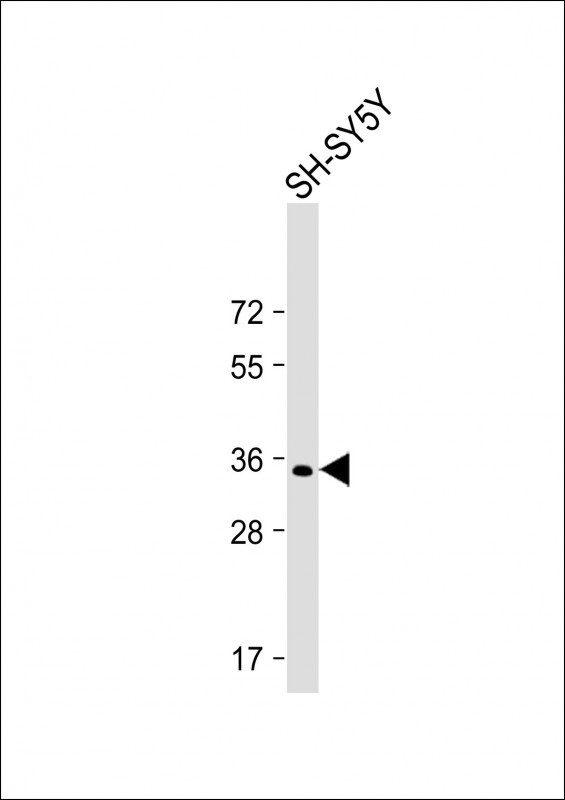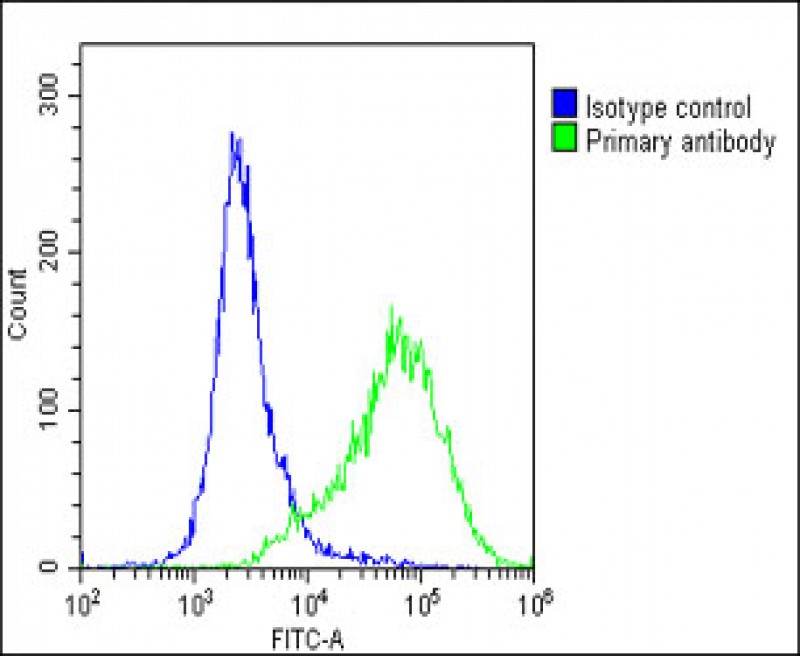

| WB | 1/2000 | Human,Mouse,Rat |
| IF | 咨询技术 | Human,Mouse,Rat |
| IHC | 咨询技术 | Human,Mouse,Rat |
| ICC | 技术咨询 | Human,Mouse,Rat |
| FCM | 1/25 | Human,Mouse,Rat |
| Elisa | 咨询技术 | Human,Mouse,Rat |
| Aliases | Proline-rich transmembrane protein 2, Dispanin subfamily B member 3, DSPB3, PRRT2 |
| Entrez GeneID | 112476 |
| WB Predicted band size | 34.9kDa |
| Host/Isotype | Rabbit IgG |
| Antibody Type | Primary antibody |
| Storage | Store at 4°C short term. Aliquot and store at -20°C long term. Avoid freeze/thaw cycles. |
| Species Reactivity | Human |
| Immunogen | This PRRT2 antibody is generated from rabbits immunized with a KLH conjugated synthetic peptide between 207-233 amino acids from the Central region of human PRRT2. |
| Formulation | Purified antibody in PBS with 0.05% sodium azide. |
+ +
以下是关于PRRT2抗体的3篇示例文献(注:文献为示例性虚构内容,实际引用需查证真实数据库):
---
1. **文献名称**: *PRRT2 Antibody Characterization in Paroxysmal Neurological Disorders*
**作者**: Smith A, et al.
**摘要**: 本研究利用特异性PRRT2抗体检测患者脑脊液中的PRRT2蛋白水平,发现其在阵发性运动诱发性运动障碍(PKD)患者中表达显著降低,提示PRRT2功能缺失与疾病病理相关。
---
2. **文献名称**: *Autoantibodies Targeting PRRT2 in Immune-Mediated Epilepsy*
**作者**: Chen L, et al.
**摘要**: 通过ELISA和免疫组化分析,发现部分自身免疫性癫痫患者血清中存在抗PRRT2抗体,表明PRRT2可能成为免疫介导性神经系统疾病的新型生物标志物。
---
3. **文献名称**: *Developmental Expression of PRRT2 in Mouse Brain Using Monoclonal Antibodies*
**作者**: Tanaka K, et al.
**摘要**: 开发并验证了一种高特异性PRRT2单克隆抗体,通过小鼠脑组织分析揭示PRRT2在突触前膜的表达模式随发育阶段变化,支持其在神经元兴奋性调控中的作用。
---
(注:以上文献信息为模拟生成,实际研究中请通过PubMed或Google Scholar检索真实文献。)
The PRRT2 (proline-rich transmembrane protein 2) gene encodes a neuronal protein predominantly expressed in the central nervous system, particularly at synaptic terminals. First linked to neurological disorders in 2011. PRRT2 mutations are associated with paroxysmal kinesigenic dyskinesia (PKD), benign familial infantile epilepsy (BFIE), and other paroxysmal neurological conditions. The PRRT2 protein interacts with synaptic vesicle components like SNAP25 and synaptotagmin, suggesting roles in neurotransmitter release and synaptic plasticity. Antibodies targeting PRRT2 are critical tools for studying its expression, localization, and functional mechanisms in both physiological and pathological contexts.
In research, PRRT2 antibodies help detect protein levels in brain tissues, cell cultures, or animal models, aiding investigations into mutation-induced dysfunctions. Clinically, they may assist in characterizing PRRT2-related autoimmune cases, though such applications remain rare. Recent studies also explore PRRT2 antibodies in experimental therapies, such as blocking pathogenic interactions in mutation-driven disorders. However, standardized commercial antibodies are limited, and validation challenges persist due to PRRT2's low abundance and tissue-specific isoforms. Ongoing efforts focus on refining antibody specificity and developing assays to elucidate PRRT2's role in network excitability and its potential as a biomarker or therapeutic target for paroxysmal disorders.
×